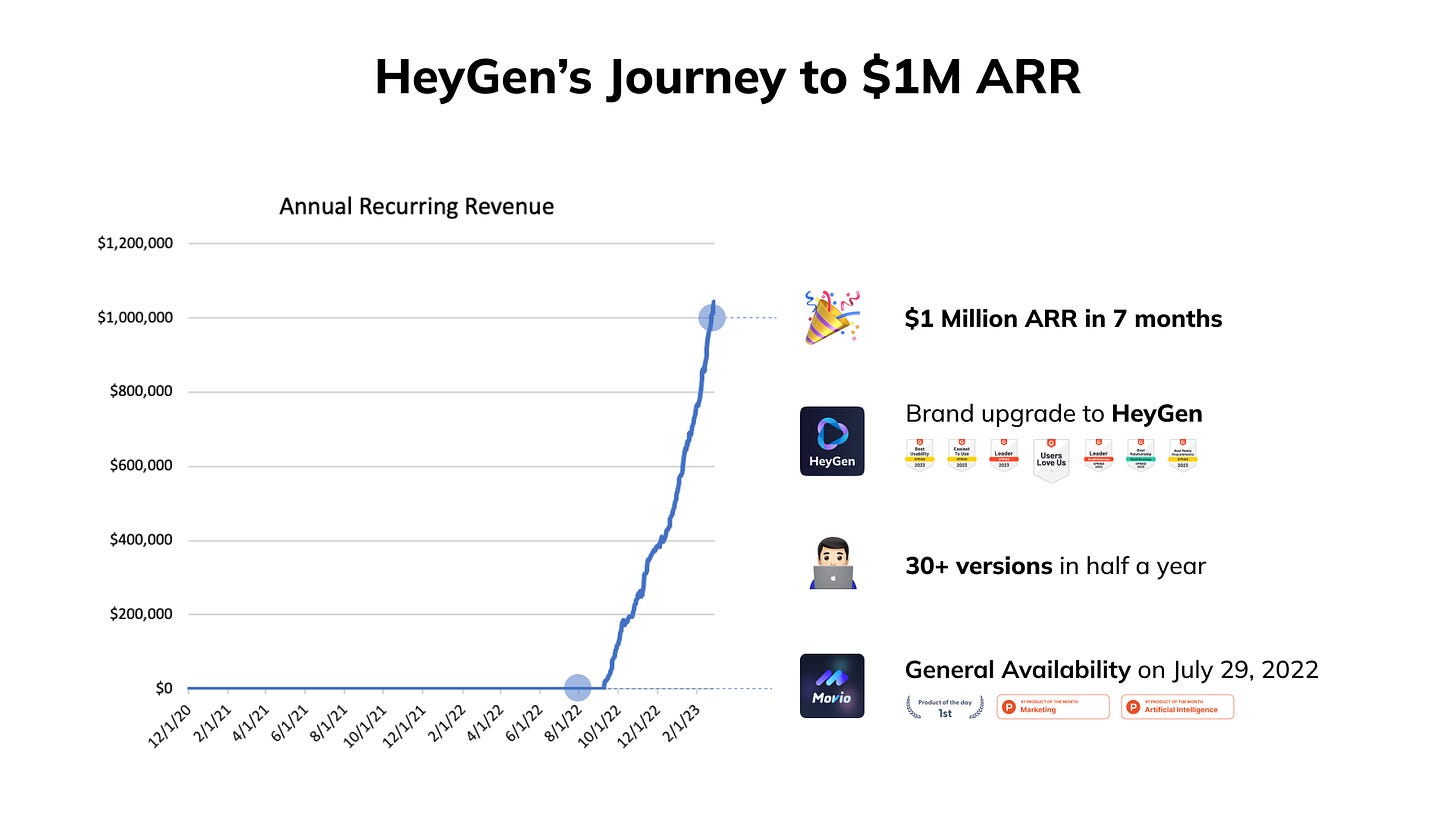How I Built This In Public: Joshua Xu
Lessons from building HeyGen from 0 to $1m ARR in 7 months
Hello everyone, it’s KP. Welcome to the 7th edition of “How I Built This In Public“, a special series that features top founders and creators who’re boldly building their projects, startups and creative ventures in public. My intention is to ask them a consistent set of simple questions and distill insights and lessons so we can all learn from their experiments.
For this edition we have Joshua Xu, Founder of HeyGen - a Generative AI Video Platform. HeyGen aims to make the “creation” cost nothing, liberating everyone’s creativity. They believe in the equation that: visual storytelling = creativity + creation.
They recently crossed an incredible milestone: $1m ARR in 7 months 🤯
Without further ado, here’s the full interview. Enjoy :)
“I’m Joshua! Founder and CEO of HeyGen. I graduated from Carnegie Mellon University in 2014 and joined Snapchat since then. I founded HeyGen in 2020 Dec with the mission to use AI to reinvent the video creation experience. ”
1. At what point in your startup journey did you begin your “build in public” journey and why?
We recently began sharing our #buildinpublic journey, detailing how we reached 1M in just 7 months. As we learned so much from the community, our goal is to give back and inspire other founders with our experiences.
2. What personal / business benefits do you believe you attracted from building in public?
Building in public boosts team accountability and garners valuable customer feedback. Sharing our story helps customers understand our thought process and commitment to enhancing the product experience, ultimately fostering trust in our brand.
3. In the early days, did you have any specific challenges or hesitations on whether you should build in public or not? If so — what were they and how did you overcome them?
Initially, there were concerns about intellectual property theft and the vulnerability of sharing ideas openly. Overcoming these challenges involves embracing a growth mindset, focusing on the advantages of building in public, and taking precautions to protect sensitive information.
4. Are there any myths or misconceptions about building in public from before that were debunked by your personal experience?
One misconception was that building in public would invite more criticism and negativity. In reality, the experience has been largely positive, with a supportive community providing constructive feedback and encouragement.
5. What are your 3 tips for someone who’s just starting their “build in public” journey?
My three tips for starting a build in public journey are:
(a) Start sharing early and consistently,
(b) Be authentic and transparent, and
(c) Engage with your audience and other builders actively.
6. In your experience, how did the 80-20 rule play out? What few vital activities of BIP do you believe have resulted in high leverage outcomes for you?
Sharing the true story behind your journey is crucial, including not just the positive aspects but also the challenges and the process of achieving results. Startups can be difficult, and it's perfectly acceptable for founders to be transparent about the hurdles they face.
7. How much time do you allocate for building in public on a daily/weekly basis?
We recently began our build in public journey. While daily updates may be challenging for our business, we'll definitely share more as we reach significant milestones or gain valuable insights, including the stories that unfold along the way.
8. How did you stay motivated in the early days when generally you don’t see quick results or super high engagement as you begin building in public?
So the purpose for us to build in public is not to get traffic and more attention from the social media. The primary objective is to contribute to the community. I believe if this is a true story and sharing what we've learnt is great content and it will be helpful for some founders eventually.
9. How did you handle copycats while you built in public?
One of the biggest things I've learned during my career at Snap was that you should not be afraid of competitors copying your ideas, but instead be more concerned with continuously innovating. That mindset applies to our own startup.
10. Who are 3 people you would recommend for others to follow in the BIP niche?
(a) Kevon Cheung
(b) Rosie Sherry
(c) Pieter Levels
That’s a wrap for now! Hope you enjoyed this piece.
Here are the rest of the interviews in this “How I Built This In Public“ series.
Would love to hear any comments, feedback or questions. If you enjoyed this article, don’t forget to share the link on your Twitter, LinkedIn etc. Also, feel free to DM or reply to me for cross-promotions or ad sponsorships.
Thank you!


